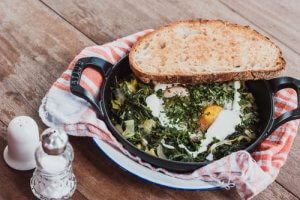Fatigued? Brain fog? Drained? You could be low in iron.

Many clients have come to me recently with symptoms of low iron such as fatigue, lack of energy, brain fog and in severe cases with shortness of breath and heart palpitations. Sustained low iron intake could cause iron deficiency anaemia. The World Health organisation (WHO) recognised iron deficiency anaemia as the most common form of anaemia affecting around 2 billion people globally. By ensuring we have enough iron in our diets we can avoid iron deficiency anaemia and feel energised! So, I’d like to break down what iron is, why we need it and what foods are the best sources of iron.
Iron is an essential nutrient meaning we must get it from food as it is not synthesised within the body. The amount needed per person per day is based on your age, gender and overall health. Generally, women need more than men. This is because when they hit adolescence the loss of blood from their menstrual cycle increases the need for iron, in menopause this need decreases. According to the NHS (2017) the amount of iron needed per day is 8.7mg a day for men over 18, 14.8mg a day for women aged 19 to 50 and 8.7mg a day for women over 50.
Iron is a mineral which is needed to maintain many basic bodily functions. Most notably Iron is used to create haemoglobin, a protein in our red blood cells that helps to transport oxygen from our lungs and around the body. Without healthy red blood cells our bodies will struggle to access enough oxygen which will in turn make us feel tired and exhausted. Iron helps to maintain our immune systems, brain health and also helps convert food to energy which is why we feel fatigued if we don’t have enough.
There are two forms of iron in food, heme iron and non-heme iron. Heme iron is found from animal sources whereas non-heme iron is found in plant sources. This is useful to know as our bodies absorb the animal sources of iron better than the plant sources even though some plant sources can sometimes contain more iron. Vegetarians and vegans are at risk of depleting their iron stores if they don’t include enough iron rich plant foods in their diets so a wide variety of vegetables, fruits, nuts and seeds is essential. Vitamin C aids in the absorption of iron so a little trick to increase your iron intake is to squeeze some lemon or lime onto your dark leafy greens or add strawberries into a green smoothie for maximum iron absorption!
What can I eat that is high in iron? Regardless of your diet there are lots of foods you can include to ensure you have enough iron such as:
Animal Sources (Heme Iron):
Red meat (Beef, Lamb), Organ meats (Liver), Dark poultry meats (Turkey, Duck), Egg yolk, Pork, Seafood (Prawns, Tuna, Salmon, Mackerel).
Vegetable Sources (Non-Heme Iron):
Dark green leafy veg (Spinach, Kale, Broccoli), Pulses (Lentils), Tofu, Beans (White beans, Kidney beans, Chickpeas, Soybeans), Nuts and seeds (Peanuts, Almonds, Sesame and Sunflower Seeds), Dried fruit (Figs, Apricots, Dates).
Vitamin C Sources (for better absorption of iron):
Citrus fruit (lemons, limes, grapefruit), Berries (Strawberries), Papaya, Mango, Kiwi, Sweet peppers.
It is important to note that iron should not be supplemented unless you are clinically deficient on blood tests and being advised by your GP or trained professional. This is because iron is stored within the body and high levels of iron can be toxic and can cause symptoms such as diarrhoea, vomiting, stomach pain and even tissue damage. The safest way to ensure you are getting enough iron is to try to eat one of the iron rich foods from the list at most meals. A varied and balanced diet will help to avoid deficiency but if you are still concerned about having low iron levels, are anaemic or need some professional advice please book in a nutritional therapy consultation with me via email at nourishedbylucy@gmail.com or call me for free 10 minute discovery call on 07393204656 to find out more.
Sources:
https://www.nhs.uk/conditions/vitamins-and-minerals/iron/
https://www.who.int/nutrition/publications/en/ida_assessment_prevention_control.pdf
https://www.ncbi.nlm.nih.gov/pmc/articles/PMC3964457/
https://www.bda.uk.com/resource/iron-rich-foods-iron-deficiency.html
